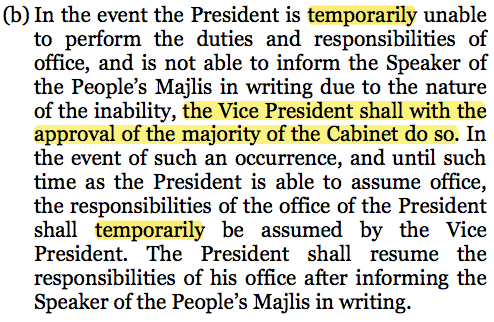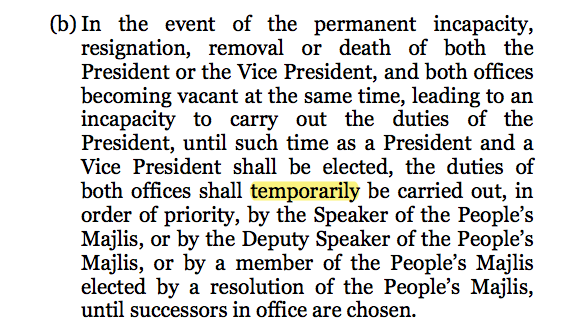The Dhivehi Rayyithunge Party (DRP) will not join its fellow government coalition partners at a gathering in Male’ to oppose an airport privatisation contract with India-based infrastructure group GMR, claiming any resolution to the dispute must be made through the courts.
DRP Spokesperson Ibrahim Shareef has told Minivan News that while the party itself questioned if the GMR deal was in the best interest of the public, “due process” had to be followed through proper legal channels in order to establish if any wrong doing had occurred with the airport contract.
“Right now we do not feel that the best option is to take to the streets on this matter. We do not know what the purpose of this [coalition] gathering is, so we will not be taking part,” he said.
Shareef added that the party’s position remained that the government was bound to the agreement should it fail to prove through due process that the contract to develop and manage Ibrahim Nasir International Airport (INIA) was invalid.
The comments were made as key financial figures within the former government maintained this week that the deal was vital to not only modernise and boost efficiency at the airport, but also to address concerns over present state expenditure through a focus on privatisation.
Under the terms of the agreement – a US$511 million deal representing the largest ever case of foreign investment in the Maldives’ history – GMR agreed to a 25 year concession agreement to develop and manage the site, as well as redevelop the existing terminal by the end of this year.
The document was overseen by the International Finance Corporation (IFC), a member of the World Bank group and the largest global institution focused on private sector projects in developing countries.
However, the Maldives government earlier this month accused the IFC of negligence during the bidding process for INIA – allegations there were rejected by the organisation amidst continued calls from government-aligned parties to renationalise the airport.
Both the government and GMR are presently involved in an arbitration case in Singapore over the airport development.
Coalition gathering
With the arbitration ongoing, six government-aligned parties are set to hold a gathering from 9:00pm on Thursday night at the Artificial Beach area of Male’ calling for INIA, as the country’s main airport, to be “returned to Maldivians”.
Through a movement called “Maldivians’ airport back to Maldivians”, the coalition – excluding the DRP – told local media this week that the gathering represents the first in a series of activities aimed at regaining management of the airport.
According to local newspaper Haveeru, Sheikh Imran Abdulla of the government-aligned religious Adhaalath Party (AP) said the gathering was aimed at showing the coalition would take a “united stand” on opposing the GMR deal until the airport was “liberated”.
“Our hope is on the night the true feeling of the Maldivian people would be revealed on the airport issue,” he was quoted as saying by Haveeru.
The coalition movement is also expected to detail what it has claimed are losses sustained to the local economy from the awarding of the company to the Indian infrastructure group.
Sheik Imran was not responding to calls at the time of press. However, fellow AP member and Maldives’ Islamic Affairs Minister, Sheikh Mohamed Shaheem Ali Saeed, said he had “no idea” about any such gathering being held.
Meanwhile Dr Hassan Saeed, head of fellow coalition member the Dhivehi Qaumee Party (DQP), referred a query by Minivan News about the gathering to the party’s Secretary General, Abdulla Ameen. Ameen was not returning calls at the time of press.
Progressive Party of Maldives (PPM) Parliamentary Group Leader Abdulla Yameen meanwhile referred enquiries about the gathering to Secretary General Yumna Maumoon – daughter of former President Maumoon Abdul Gayoom. Yumna was not responding to calls at the time of press.
DRP Spokesperson Shareef claimed that even should the validity of the agreement between GMR and the former government be found to be questionable, it remained for the courts to decide on such a matter. Shareef added that senior members of his party had been penalised for holding such views by political opponents.
“Both [DRP Leader] Ahmed Thasmeen Ali and Parliamentary Speaker Abdulla Shahid have been accused of taking bribes on this matter and trying to obstruct efforts to take the airport,” he said.
Shareef claimed the allegations had been devised by a faction formed in the DRP by members loyal to former party head and national President Gayoom, which later branched off to form the PPM party last year.
“Gayoom’s supporters had wished to take the airport back by force,” he said. “I’m not saying the deal is fair, but first we can look to renegotiate terms and get a new agreement. Also the government has the resources to investigate the deal and make the best decision on how to move forward to benefit the Maldivian people.”
Shareef added that the party had therefore decided against “taking to the streets” with other parties in President Waheed’s coalition government.
“We are not saying that the former government were not involved in something improper with the agreement,” he claimed. “But we do not see the previous government as an MDP government, or the current government as a DRP or PPM government, it is always the government of the Maldives, so if an agreement made by the government is found to be valid, than it must be honoured under the law.”
Privatisation pursuit
Speaking yesterday on private broadcaster Raaje TV, former Economic Development Minister Mahmoud Razee said the GMR deal reflected a commitment by the former government to pursue privatisation as outlined in the MDP’s manifesto.
“Firstly, if or when anything is run like a business, private people are more skilled and efficient. They are far more competent and they work for profit unlike the government,” he claimed. “This means it requires less cost for the government, but needs more outside investment or capital. Private people are more skilled and efficient in terms of managing. The end product thus is more beneficial.”
Addressing criticisms from some local politicians that privatisation provided no benefits to the nation, Razee conceded there was an element of truth to the assumption, but stressed it did not reflect longer-term economic benefits.
“Because the investment is huge, the project is big; the first beneficiaries are always the investors. True. The benefits go to the foreigners,” he said. “In foreign countries, they make a consortium, which means the profits are being shared within multiple parties. For example, if a Turkish company is investing here, it doesn’t mean they do everything themselves. If they are developing a property, the construction, or other necessary work is done through local companies.”
Also speaking during the programme was MDP member and former Minister of Finance and Treasury Mohamed Shihab. Shihab claimed that in cases where there was limited national budgets such as in the development of a new airport terminal, then finance should be sought from outside sources.
He added that as within the case of technology and other expertise, and pointed to local resort groups such as Universal Resorts Maldives as examples in the country’s past where foreign partnerships had benefited the country’s economy.
“Resort owners do [private partnerships] because they profit from it. Let’s conduct a survey among resorts. Definitely the salaries and service charges are higher in foreign managed companies. It is a fact that, countries where foreign investment has been made are far more developed.”
Speaking earlier this year, INIA Chief Executive Officer Andrew Harrison claimed that INIA would remain a Maldivian owned enterprise that would be continuously developed by the company for the duration of the tender.
“We are just the caretakers here,” he said. ”The airport remains and has always been owned by Maldivians.”
Harrison contended that to ensure profitability for its investment in the airport, GMR was itself committed to strengthening the wider Maldivian economy by working with local businesses, industry and contractors.
 (0)Dislikes
(0)Dislikes (0)
(0)

